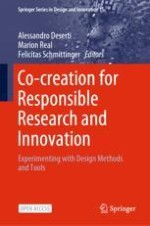This open access book summarizes research being pursued within the SISCODE (Society in Innovation and Science through CO-DEsign) project, funded by the EU under the H2020 programme, the goal of which is to set up an analytical, reflective and learning framework to explore the transformations in initiatives and policies emerging from the interaction between citizens and stakeholders. The book provides a critical analysis of the co-design processes activated in 10 co-creation labs addressing societal challenges across Europe. Each lab as a case study of real-life experimentation is described through its journey, starting from the purpose on the ground of the experimentation and the challenge addressed. Specific attention is then drawn on the role of policies and policy maker engagement. Finally, the experimentation is enquired in terms of its output, transformations triggered within the organization and the overall ecosystem, and its outcomes, opening the reasoning towards the lessons learnt and reflections that the entire co-creation journey brought.
